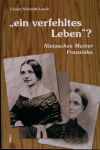
Ursula Schmidt-Losch
"ein verfehltes Leben"? Nietzsches Mutter Franziska
Alibri Verlag, Aschaffenburg 2001, 124 S., ISBN 3-932710-45-2. Preis: 10 EUR
 |
Book Review |
Order this book from Amazon.de 
|
|
The author of this book on Nietzsche's mother Franziska is the wife of the well-known Nietzsche researcher, Prof. Dr. H.-J. Schmidt, in whose book series, "Aufkärungen zu Nietzsche" this book has been published as volume 3. It consists of three parts: – The first 40 pages provide an overview of the life of Nietzsche's mother and represent an extended version of a lecture of the author on the occasion of the 100th anniversary of the death of Nietzsche's mother (April 20, 1897) at Naumburg. – The 60 pages that follow offer an overview on important documents, among which Franziska Nietzsche's record of her own life, "Mein Leben" (of 1895) is the most notable. – The last section, "Anstatt eines Nachworts" (in lieu of an epilogue), on approximately 15 pages, discusses the "religiöse Sprache im Hause Nietzsche" (religious language in the Nietzsche household); this is also based on a lecture, has, however, been somewhat shortened; the author had originally held this lecture on the occasion of the 100th anniversary of Nietzsche's death, on August 25, 200, at the Naumburg Nietzsche Congress. To begin with, this biographical sketch refers to the problematics of such a sketch, both from the available material and with respect to Nietzsche's sister, Elisabeth Förster-Nietzsche, who, as is known, has ensured that all written testimony with respect to details of her family have come into her possession and who, as might also be known, has used this material in order to produce tendentious reports; Elisabeth's allegation with respect to her own mother also provides the title question of this book, "ein verfehltes Leben"? (a failed life); Franziska's childhood at Pobles (near Röcken), her seven years at Röcken after her marriage (1843), her move to Naumburg after the death of Ludwig Nietzsche (Juli, 1849) and the various stages of her life there form the basic layout of this biographical sketch, in which her daughter's allegation is supposed to be examined as to its veracity; in her sketch, the writer somewhat relies on the results of H.J. Schmidt in his "Nietzsche absconditus"–thus, in this context perhaps unexpectedly, we find references to the latter's deliberations as to Nietzsche's allegedly being influenced by Ortlepp (see A&K, Nietzsche-Sonderheft 4/2000, p. 69 ff.) and also to Schmidt's still more daring speculations as to Nietzsche's possible suicide attempt at the age of 14. The documentation that follows offers, in addition to the "Sentenzen" by Franziska and in addition to a longer letter by Elisabeth, the already mentioned "Mein Leben" (My Life) from Franziska's pen; unfortunately, this autobiographical sketch that offers a great deal of background information, only covers Franziska's childhood years and her youth up to her marriage to Ludwig Nietzsche and breaks off with the birth of Friedrich Nietzsche on October 15, 1844. Perhaps less important are her brother Oskar Oehler's (born in 1839) memoirs, "Erinnerungen aus meinem Leben" of 1982, who did not really consciously 'experience' his his older sister (born in 1826), by the way, exactly the 'middle' child of 11 children. Therefore, from these memoirs we learn some details of their parents and of their life style, but hardly anything about his sister. The concluding section--"der liebe Gott wird"... Religiöse Sprache im Hause Nietzsche 1844-1849 und ihre früh(st)en Folgen (which discusses the religious language in the Nietzsche household during the years of 1844 - 1849)–in its outlook and in its mission, is directly connected to that of H. J. Schmidt, insofar here, the language conditioning respectively "traumatization" of Nietzsche, particularly with respect to the terms of "Gott" (god) and "der Herr" (the Lord), are the subject of enquiry, to the mastering of which Nietzsche is supposed to have developed his philosophy as a "genial attempt". Particularly, paralelly to "Nietzsche absconditus Kindheit" (Kindheit = childhood), the terrible death of his father, whose healing by God had still been considered possible by the residents of the pastor's home but which "Gott" (God) failed to do, is seen as a "basic" point of departure for Nietzsche's philosophy, up to 1889. This epilogue also makes it clear: Even if one consciously wants to turn to Nietzsche's mother Franziska, all actual writing about her is connected with the importance of her son and with the importance for her son. In this sense, the book delivers on providing "insights" into the material background of Nietzsche and of the role of his mother in his life, which is particularly demonstrated in her caring for her ill son from 1889 up to her death in 1897, which, in spite of all previous differences, shows her self-sacrificing dedication and greatness (with which also the question raised in the title of this book is answered). Those who, in addition to reading German fairly well, are interested in investigating Nietzsche's personality more in-depth, which is, as is known, inseparably linked to his work, should not miss out on reading this book in which material on his mother is put together in this way, for the first time. |